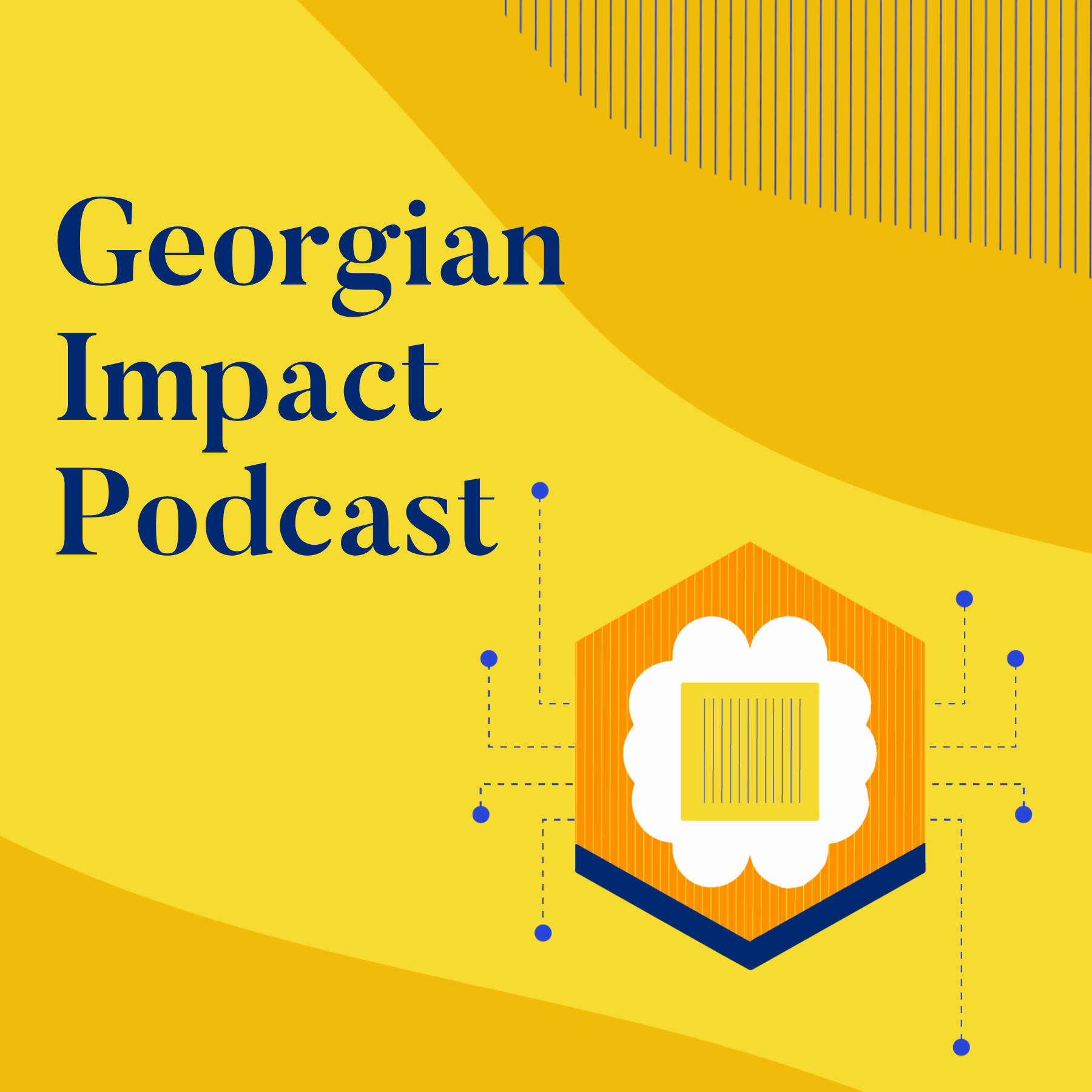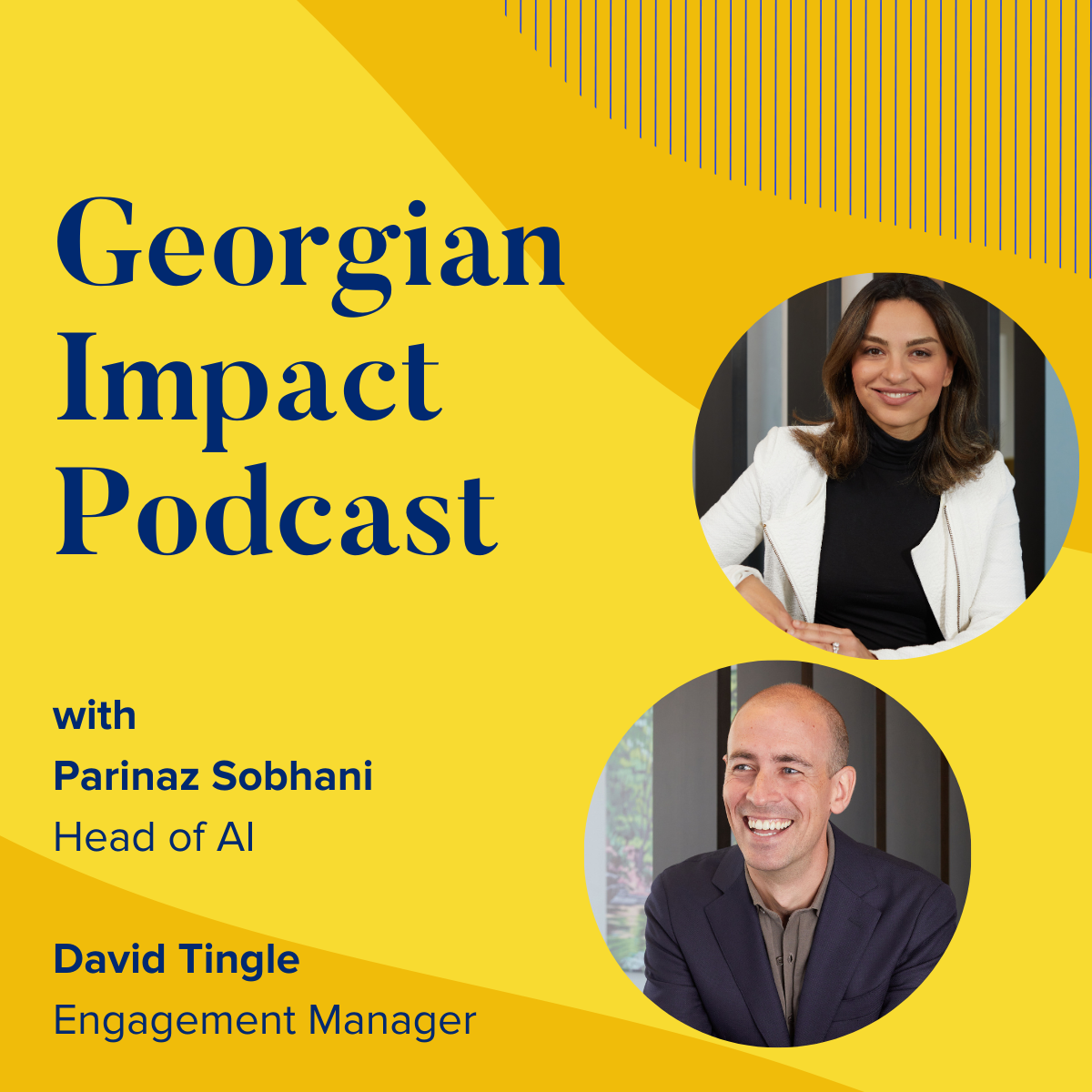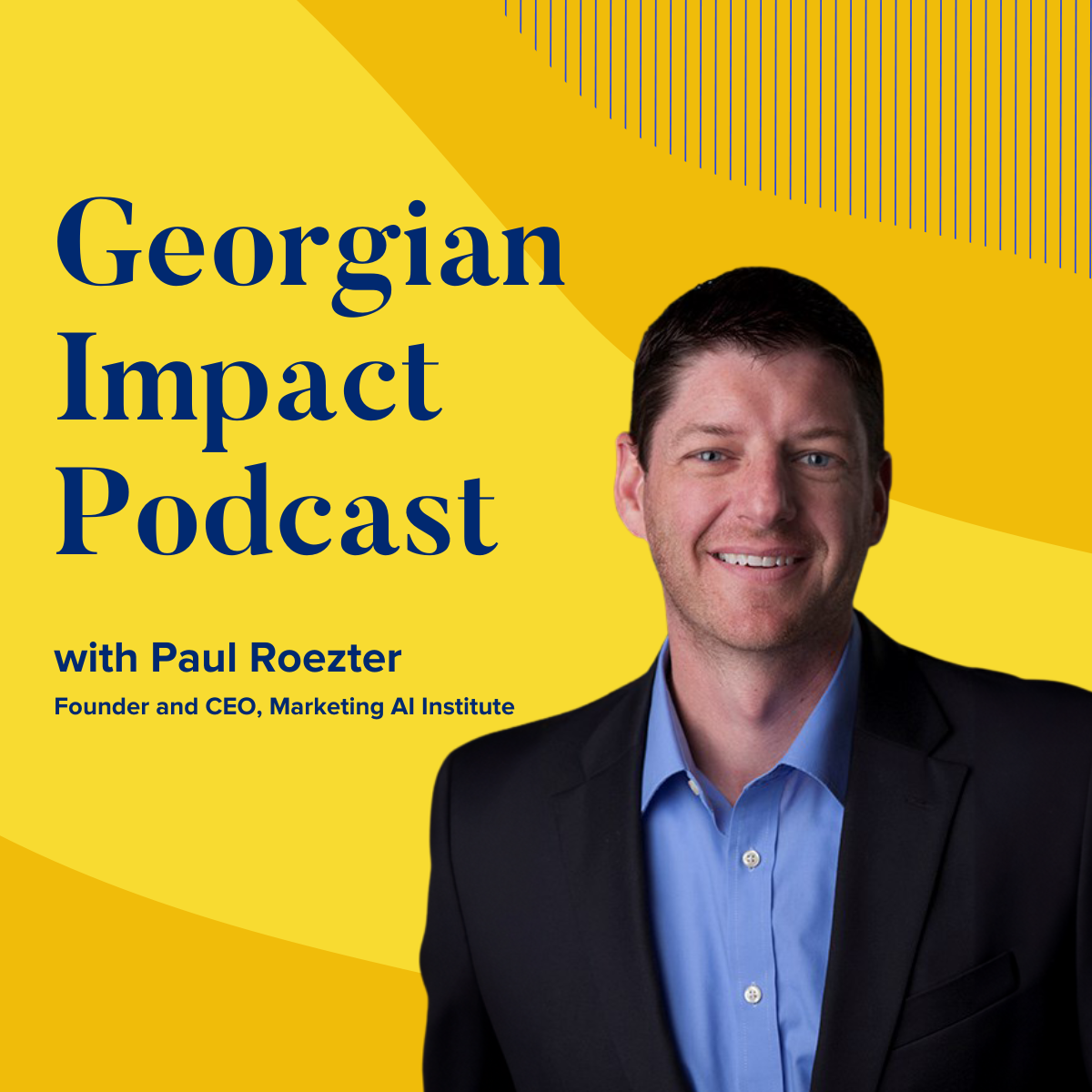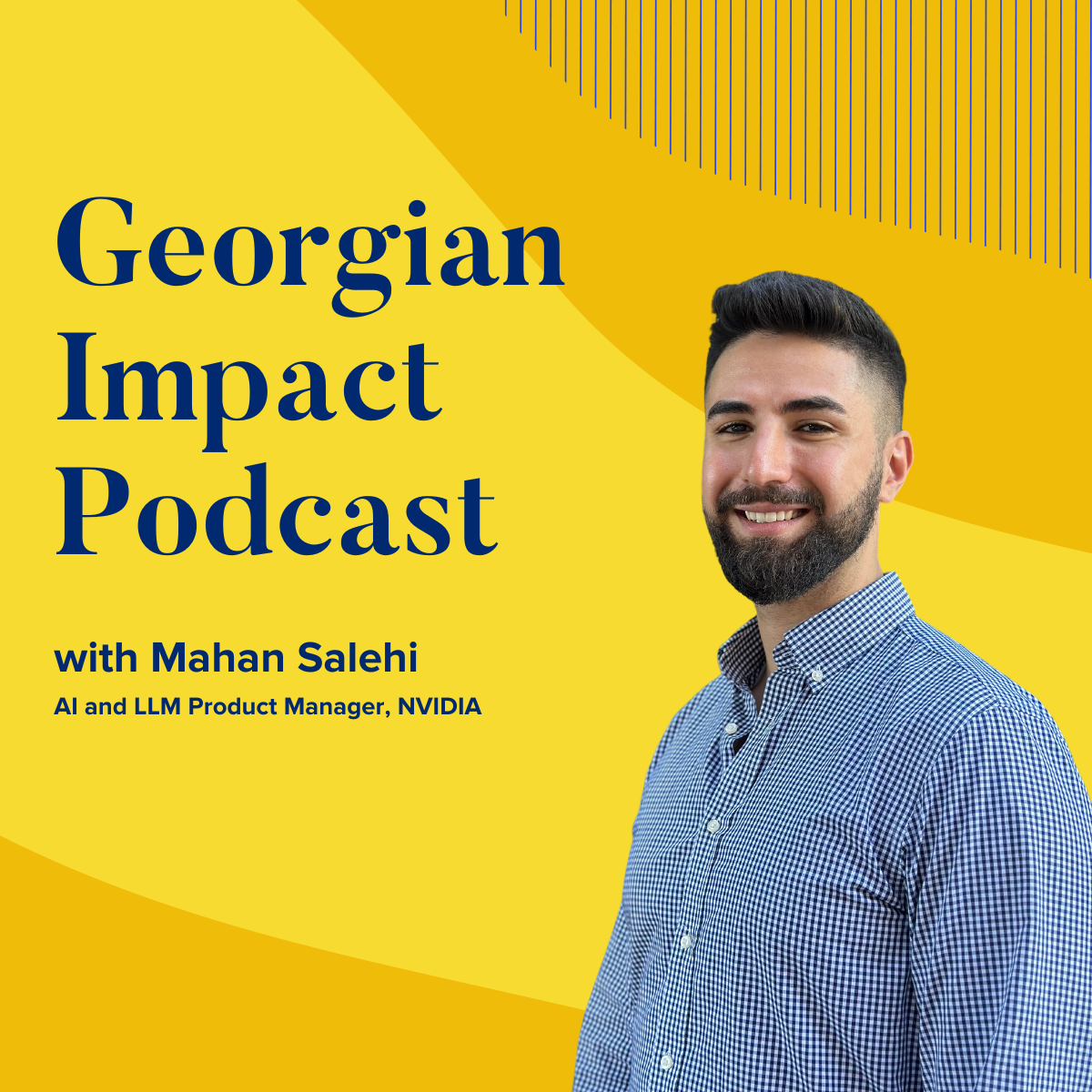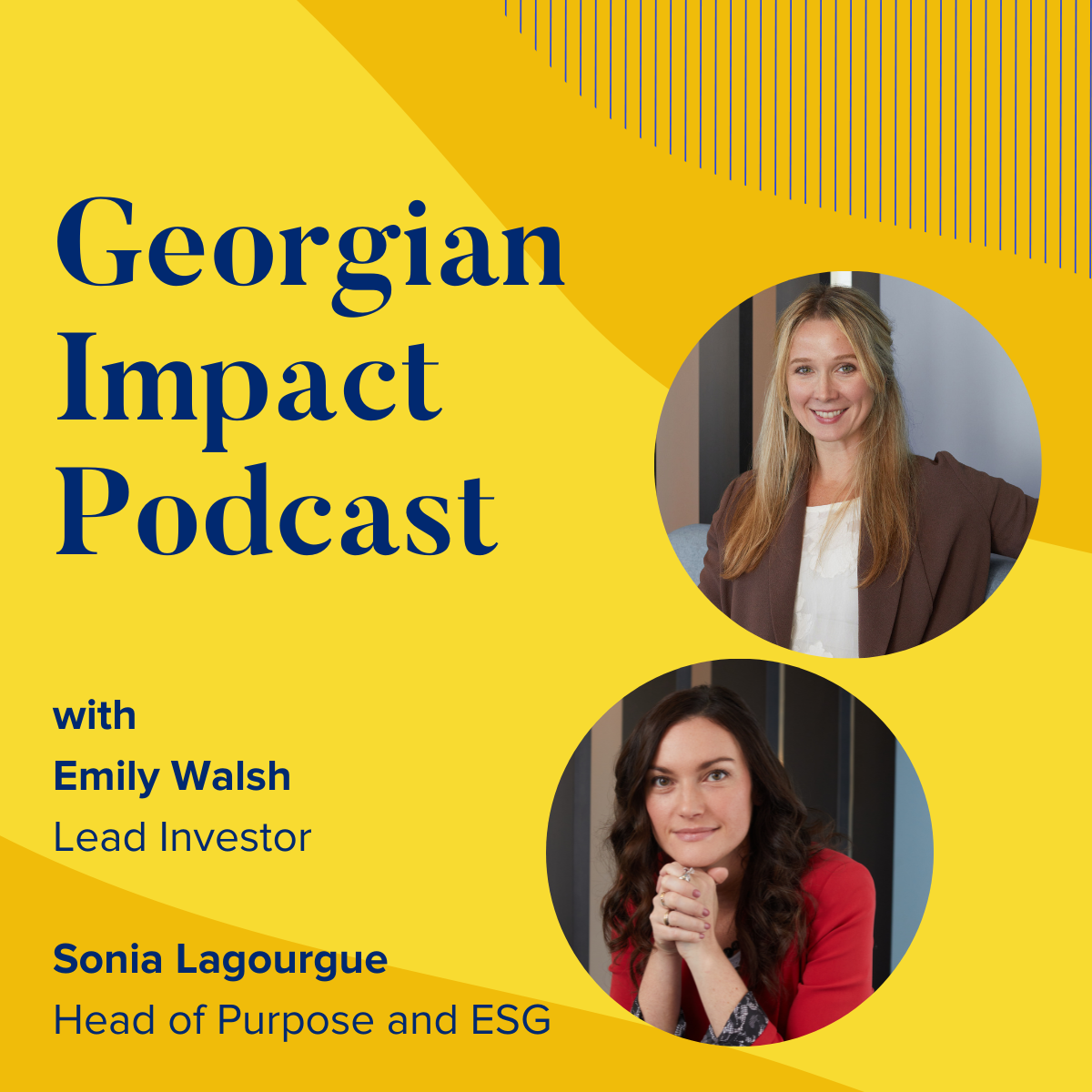Episode 117: Leading From Home
- 0.5
- 1
- 1.25
- 1.5
- 1.75
- 2
I'm John trial and this is a special edition of Georgians impact podcast.
I'm an avid podcast listener and just as I've been inundated with covid-19 emails from every company that has my email address. I've also been quite overwhelmed and pleased by podcast hosts announcing that there's a closet in their bathroom in their parents house and more and these are just great examples of how fortunate we are to have technology that enables some of us to continue to do our jobs while staying safe and protecting others buying a bearing in place. My heart and best wishes goes out to those who aren't that fortunate and are providing vital services to our Global Community delivery people reach out clerks Healthcare professionals just to name a few. Thank you. Stay safe.
Right now I am coming to you from home in Vermont for me. This is standard operating procedure and with me today is my friend my colleague and now my boss been wild now Ben is George and VP of marketing, but that's not why I'm talking we're talking has been lives in New Zealand and today's broadcast a special cuz Ben and I have been part of Georgia and since his early days and with a lot of experience being remote man was dead even before working for George and a time. So between the two of us, we've got more than a couple of Decades of working from home. So this is a perfect time to step away from emerging Technologies machine learning AI off and really talk about what it means to be working at home. Now. It wouldn't be fair to say it's a breeze, but we've learned a lot from working together and working with a larger team in Toronto. And our first topic today will be on being effective working at home.
And in our case, it's not just being effective at your job. So also are being a person in your household resident a parent a partner. It takes a lot for the past couple of years been has been managing a talent team of professionals and me. I'm looking forward to chatting with ban about what it takes to be a leader far far away. Now, please don't think of this as like a short-term podcast for the moment cuz it's not our work lives are going to change AC after Corona what we're doing today is likely to affect much of what we do moving forward and we really do hope you find this discussion choose from
So Ben covid-19 is the new context working at home is an old issue how much more difficult are things are now than say they were the end of last year for sure the minimum might see a harder Edge to load. What's your thoughts? I think things are probably for those of us who already working remotely or working from home things are probably easier if anything because now with colleagues are you know doing the same thing. So there's more empathy there's more focused at all living the dream whether they wanted to or not. I think though that you make a few point, which is this isn't really a the huge work from home experiment. It's been described as because it's work-from-home plus the added stress of the pandemic. Where do you think will be when all this is said and done this is a full second function that is going through make working remotely for those that want to do in the future and I'm sure there'll be some people that suck.
Want to have to wait from home again after this next few weeks or months, but for those of us that do work from home, I think we'll find it a lot easier to do. So, you know, I think they'll be a lot more understanding of wage productivity is and what is required to support that style of work. Let's talk about some of the differences when it comes to interacting with others and we'll start with a kind of a team-first you seen a great changes or is it business as usual when you're having say formal meeting staff meetings and the like are you think people are making more of an effort from the remote worker perspective appeals more balanced with all on Zoom were all having fun General making an effort versus, you know you and I may be connecting into a cord as predominantly focused on the people that are in the room. And so I think it's a difference but I think there's definitely more of a effort to have fun. I mean, we're all playing around with the the snap camera filters or the zoom virtual backgrounds or whatever. Everyone's wage.
In a bit of fun with it and trying to lighten the mood and making a real effort to connect with people through the medium of videoconferencing. I do like your point and I think you're right. If there's a conference room full of a whole bunch of people in a handful of people remote. It's easy to forget that even if their faces are up on Zoom. It's still a bit of the dog wagging the tail and it's hard to kind of get in. So you're right when this is all done. Maybe we'll move from a checker board of faces on Zoom to the old model, but the awareness of what it means to be remote should change now that could have a fundamental change in how most businesses work. So I took it about management by walking around. How do we think about informal Outreach? Is it sufficient to just slack somebody and say got five minutes. Do you need a formal look up on people's calendars? Are they busy or not? What's your thoughts on how do you manage that and how we all should think about that? Well, I do think messaging applications whether it's slack or Microsoft teams or something else.
A bit more informal bit more real time is really important. It doesn't feel the same. It can use an email calling people to see how they are is also, you know, it's a big Interruption so long I do think those messaging it's like slack and Microsoft teams and others have a really important role to play. That's how I do it. I'd like to check it on people that way and try and make a point of checking in on people to maintain as well. And I I also think checking in on people, you know, starting off on the call and asking people how they're going is is a good habit that we should all be doing. Anyway, and I see that happening a lot more as well. Just taking time to chat with people and and I think there's another shift that we've certainly made on our team is
A lot of our conversations as a team or even one of the ones are more about how other people are doing and less about reporting back on work. There's plenty of other ways to report back on where you know, we put up now daily stand-up information as you know and slack we don't need to do that when we meet as a team. We can share a joke or something instead when we're actually talking to each other. I'm also fighting it. I really like this some of these unplanned connections on the personal side. I'm reaching out to friends more often having more phone calls and I'm finding it professionally as well that I was chatting with somebody talk about some business and we both said, you know, we haven't been really caught up in a while. Why don't we just chat so, you know tomorrow morning we're going to grab 15 minutes and catch up so friends of mine here in New Zealand often living in one Island and one another had dinner together last night where they set the table when they put a laptop at one end of the table and so two households had dinner together while video conference wage.
So there was quite a clever idea with now officially in full lockdown here in New Zealand. So you're not allowed out of your home unless you're going out for that small amount of exercise or going to the supermarket or dr. So, I think a lot more people will be doing things like that and I've found over the years that that's actually it's really nice way of spending time with people who are not near you as opposed to just have you know, assume call on or FaceTime video call on while you're doing other things. You don't have to be just talking to people so, you know, John you're alive over and just worked on stuff together, right and just both being there with the noise in the background and that's that's another way of having some of those less Formal Connections because you're used to having you used to Signal office used to hearing other people around you is actually no reason that has to stop when you're with your remote. Right, right. Okay, so then let's talk a little bit about meeting etiquette. Yep.
As I'm a bit grubby and I'm sitting in a club chair and I haven't shaved yet and you come on and you're in a Blazer. Well, I mean, I know the Wiz do it but I do sometimes feel like I want to get dressed thoughts and put a maybe a blazer on over a t-shirt. I might just have jeans and in like slippers on you know, I enjoy getting dressed for work, but I don't always do it and talk with you in a whole day of being wearing hoodies a lot more recently probably because you know, we feel much more like a tech company these days that are Venture Capital firms. So it's sort of going with that dream. But yeah, I think it makes sense to go through the routine and the ritual of getting dressed especially if you're new to working remotely. It helps create some of that separation. You're putting your thoughts on if you like. Can you going off to the thing and then when you finish working for the day you can take it off and put your laptop away and especially for those of us that live in small spaces wage.
Don't have a the luxury of having a study where we can go and work. You know, maybe you're working in your bedroom. Where you working at the kitchen table. I think part of that dressing routine could be helpful in creating some relation between work and life and you know Finding ways to make sure you just don't work all the time because contrary to I guess some sucker management misconceptions over the years Folks at work from home don't under work they tend to overwork and it's the battle with working remotely Whitman poem is really to put some boundaries around things and not end up just working the whole time. I just to close on the Blazer piece and it's a reminder. It's good to have your camera on and I kind of like that your message about you putting your armor on this is your part of a team, you know, even making that extra effort is seen by everybody else. So let's talk about work-life a little bit and I think just to get started with it's a good khong.
Cuz there's no right answer for everybody. There's never a single answer for people when I was an exec and I would always work late at night. I felt really guilty. Sometimes if I'd send an email out and wash my junior people would respond to me cuz I felt like I forced them to it. So often after say 9 9:30, whatever some time I'd go offline my emails would stay local and then I drink up in the morning so it wasn't forcing them to work. So that's what I was doing then and here you are now in a time zone. I don't know eighteen hours off and I as a part-timer always want to be responsive. So it's different your days are different than my days you and I always knew over the years at Sunday night for perfect for me and it was your Monday morning and we worked out well on that but talk a bit more about kind of whether you need to stick to a schedule you are often up at 5 a.m. For meetings. I think it probably took a while for you to train the team in Canada not to book morning meetings at home.
D part of think we threw kind of the days and how you managed all that freaks ability or rounds is quite important. So I do because of the time difference. I do make sure that I'm home. I stay on the Madelia so I can have a quick window even during my winter here when summer and US and Canada and there's really any of four or five hours reasonable window of work where we overnight. So, you know, if I was to start work at a normal time like 7 or 8 or 9 in the morning would be literally one will know our hours and overlaps. So that's just a, you know, practical reality of me choosing to live in New Zealand having to accommodate the East Coast time zone a little bit.
For myself, the way that I create boundaries is interesting. I tend to stop so the mid-to-late afternoon at least and go do some exercise and I might come back to things later in life in my evening. I get this forced structure where I had meetings in the morning and then everyone else is kind of done in so I have quiet time where I can work in the afternoon. So that's kind of the basic structure of my life, but I do find myself at the moment, especially with everything that's going on camera situation. I'm working my Mondays as well as your Fridays during the week six days a week. That's what I had been doing when that's been busy in the past. I've been getting out for you know front afternoon my time ride or Monday afternoon bike ride or something. I'd had just need a little bit more difficult, but it's still something. I will maintain as grabbing those extra times during the day for a bit of exercise. So,
That's partly how I do it. My team is also quite accommodating in its they will occasionally week do some evening stuff cuz it also suits them to maybe have a bit of time off during the day and especially now with with everyone working from home. There's a real need for some of the team members to do a bit of work. They feel like I want to get the work done when the kids are in bed and they'll take a bit more time during the day when the kids are away. That's a great one. That's the classic if you have an employee and employer as a 3 p.m. Soccer game tell you employ go to the soccer game, you know, you're going to get your time back in spades later that night from a dedicated employee. I think that's a very important point is that when working in this sort of situation, we've got to focus on output really focus on what's being a month if not time at the desk and it's not about whether they're at the desk from 9 to 5, that's kind of pointless. What needs to be focused on is what is the most important thing?
Would they need to be doing right now? And do they understand it? Do they have everything they need to do that? And then what's the outcomes in the output from that and not the number of hours that are spent on it and that's when you start to look at things that way and you trust your employees to get the job done that makes us remote work thing a lot easier because it's just not practical or is it just doesn't work to you know be checking up on people in terms of hours work that really the focus on the outcome, but it's not just the outcome which I absolutely respect and agree with it's also the exact mileage meant that they're 24 hours in everyone's day and there are other things to do. I actually talked to a colleague who was remarking to me that it was easier to focus in the office off. This small child at home was being taken care of by someone else and now we're working at home. This person's working at home. And here's the kid in the other room may be crying and so you have to be particularly sensitive.
I had a meeting with another colleague today that we realized we did need we're going to rebook it and actually said oh you got 45 minutes free go hang out with your daughter. It's not about like you say not ours at the desk. It's also not just work product. But it's working life product that needs to be thought through what is and it was always the case of working from home is like finding better ways of measuring performance package don't relate to the amount of effort but more the output right now. It's especially true is that we have to realize that this is my point the beginning of the podcast off. This is not really a mess work from home experiment. It's a work from home with the kids at home with the potentially your partner spouse or flatmate roommates at home as well. Everyone is a grandma whoever it is in debt makes it particularly difficult and I think that's important to remember that people are dealing with that and then people are dealing with the stress of the situation as well as well as the adjustment wage.
So it's not just a matter of focusing on outputs. Also focusing on what really matters right now and the fearing is much other stuff as you can and then again if you want to have productive when you can work at home, it's a good idea to invest some time during the day and helping out around the home doing some dishes putting on washing and not trying to be in your kind of silence for eight hours. It's not a sustainable model. You need to be a an active participant in helping the household in exchange for that other members of the household might be more willing to help look after the kids or whatever when you really do need some quiet time to get some work done or do a call. So but just to wrap this up then we have really haven't talked much about we've touched on them. But what are some of the tools your thoughts and the tools that we've been working with what we've gone through recently at Georgian is that we handle all the tools in place, but we didn't necessarily have a processes. So some of the tools, you know, we've been using over the place.
Is you mentioned some of them with doing this on soon when you select whether you believe we still use email but Slackers are predominant internal communication mechanism, but they're Slackers greater some things and not others. So we use click up now or trekking tasks. I've started using their to your point earlier Joan about not just firing things off in the middle of the night. I'm finding click up now quite useful to from within slack just a fire offer to do to someone's work you so they can look at it in the morning or you don't have to have it, you know a message from your boss sitting there at 11 p.m. At night on Sunday. It can go into the queue and they can check it. So I think technology has a huge role to play here. That's not just the video conferencing. It's the video conferencing. It's the messaging. It's the project management base. It's a simple things like using she had documents like a Google doc instead of a Word document. I know word has like real time sharing and stuff like that now but dead.
Having that functionality of working on a Google document with someone else seeing them type you type in your boots can really add to that sense of connectedness that you know, you gave you do their own video you're there and you can hear the person but then you can both you know co-create something is I think very helpful as well. So the technology really does matter and whatever the other stuff is that your page is very my organization, but think about that and think about how you use it. I think it makes a huge difference beautiful. So we did a nice evolution in terms of working with colleagues and supporting as team leaders, but you know, we're now got you in a real formal leadership position. So take me through and I like the comments about results and how we talked about balancing work life expectation. So what do you think the biggest difference for you was managing just yourself in New Zealand versus managing a team that's remote to you now.
A great question. I think the starting point for me has been to make sure that I'm starting from a position of trust with my staff and giving them the responsibility and authority to with my support figure out what the role needs to be in in really take ownership over there and that came in and helps them stay motivated stay focused. So I guess it's probably I've had a bit of a bias in my hiring profile to find books that are self-murder Thursday. It's in that sense, you know, cuz I knew that they would need to be in order to be successful cuz I can't be there sitting next to them standing over them the whole time. So I've had to approach the whole process of hiring and you know in in bringing people on board in that in that context of me not being there all the time. So I think that's been the starting point. I'm a big fan of theirs wiseman's wage.
In the book multipliers and rookie smarts, as you know, a lot of key principles and near that was being talked about around, you know, delegating appropriately down to folks and offering them to take ownership. And I think we've seen it on our team page on that when you do that people could be highly effective and so my role is really in support team. I'm at the service to help them get stuff done be successful. Make sure they have their development plans in place. Make sure they are getting all the resources. They need to help me with some stuff as well. As you know, challenging be thinking in challenging them on stuff as well. And that's I guess the evolution I've taken cuz to your point the first ten years that I was with Georgian most of em was I was managing contractors or two dozen others, but not employees and then the last couple of years we built a team out in so it's been that shift for me and that's the approach I've taken now.
May not be and I probably isn't relevant to the your current team. But let's kind of stay theoretical a little bit. So I think it's important as a manager to work with all your folks as a human nature to work with people you're more comfortable with and use force yourself as a manager to work with people. Sometimes you're not more comfortable with but let's stay on this trust theme. What about working with someone then you really haven't built that the system of trust yet. What do you do? How you going to work on that wage? Well, I find it's often really useful to work on a project together some sort of task or output or something. Right? So some sort of shared work product is a really good way of getting some choice of whether that person on your team like working for you or you're working for them or their adjacent, I think having something to collaborate on as a great way to get to know someone and then just also just taking the time to get to know them personally.
I also always spent a fair bit of time in the office. As you know of you got to Toronto to five or six times a year. That's now not possible. So as we move towards new people when new people join the team go find other ways of getting to know them spending time with them. But you know building that personal relationship is part of it and building their own work, you know doing something with them rather than just meeting them and meetings. I guess I could see you on a resume with the computer on the other side of the table and a beer in your hand and the new employees and boom boom may be familiar you go, you know just took the work of the insect the work at building that that trust and then trust is a two-way street. So what do you do to engender your team trust in you great Christian, I think it's transparency being honest being up-front being direct, you know sharing appropriately but not trying to play games of information but laughing
Things out as they are and and I think you know that directness and honesty goes a long way. I think it's important when you are remote to make sure that you listen really well and ask a questions and then from a good feedback. I mean it's also true any sort of management relationship, but I think that's a really good song and sometimes you've got a higher level position in the company than the people and so your job when you look left and right across your organization, you see things that the team doesn't see and of course a team has to look left and right and work comfortably without management guidance. That's what makes a good team. So how often do you focus on thinking about let me pass some corporate messaging down versus liquid the bottoms up see how things are going. Obviously, they're all needs to happen. But what's your sense of the balance between the two top down vs bottoms up here? Well, I think it all comes back to supporting your team.
To get to the right outcomes sharing a broader perspective as part of that in working with them on what they're working on giving them their additional context that they might not have is dead is really important and then of course it the other ones doing the actual work, right? So in the end they have to make the call on how to incorporate that corporate context and to quit doing I think it's important not to fall into the temptation of directing folks. You've got this additional as you product looking left and right maybe the strategy the organization and not pushing it down too hard making sure that it's a discussion in that they in the end have 51% of the vote. If you like, they need to decide how that changes what I'm doing. It's usually stop doing that they lose ownership in the process and then you don't get as much as their discretionary effort and then you don't get their best work in their best thinking so I'm conscious of that I bought
Quite a forceful personality. I enquired direct so I am constantly trying to make sure that I walk the right line between sharing and also challenging them without having you know, I'm pushing them in a particular direction because the other ones that are closest to the tasks in the work that needs to be done, not me so great discussion. I think trust matters I think how may inspect what you communicate really matters any final thoughts or what it takes to really work with your team now being conscious about
How you approach all this? And I think that's what's changed recently. John is that we're now very conscious about the fact that were on video. So we are trying hard that we're trying to check in on Thursday Google. We are more respectful of people when they speak up so there's all of us.
Process and cultural behavioral change which is very positive in securing. We haven't changed any Technologies, but we're changing how we use them and I think that optimistically will help. Going forward. Once we return to a whatever they post Corona landscape looks like some of those behaviors will be qualified and how we work and I think we will be better for it. I you know, I may not be in the long term months down the road. I may not see people with cats on their lap anymore and we may may not see snap camera photos with people with unicorn heads, but we are going to be in a different world and I think this discussion is great and just helping everybody get themselves a bit anchored and realized the world there in today and the world are going to be with tomorrow. So been thanks so much for taking the time to chat with me. I really appreciate it. My pleasure John. Thanks for having me off.
DESCRIPTION
Working from home isn’t new, but today an unprecedented number of people are “telecommuting” for the first time – whether they want to or not.
Our guest on this special edition of the Georgian Impact Podcast is Ben Wilde, our VP of Business Development & Marketing. Ben manages a team in Toronto from his home office in New Zealand. He’s been leading from afar for years, and shares his tips and insights with all those adapting to new ways of working during the global pandemic and beyond.
You’ll hear about:
- How work may change forever A.C. (After Coronavirus)
- Informal management of remote teams when you can’t pop by their desks
- Etiquette for video meetings and time-shifted communication
- Creating boundaries and structure when working from home
- Building trust through casual conversations and social bonding
- Being conscious about your approach to remote work
Who is Ben Wilde?
Ben Wilde is Vice President Business Development & Marketing at Georgian Partners and a member of the Georgian Impact team. He provides input to overall strategy including product management and product marketing.
Ben has more than 20 years of experience in the software industry, and has held senior product management and strategy roles at IBM, Informix, and a range of early and growth-stage startups. Ben holds a BTech (Hons) in product development from Massey University, New Zealand.
